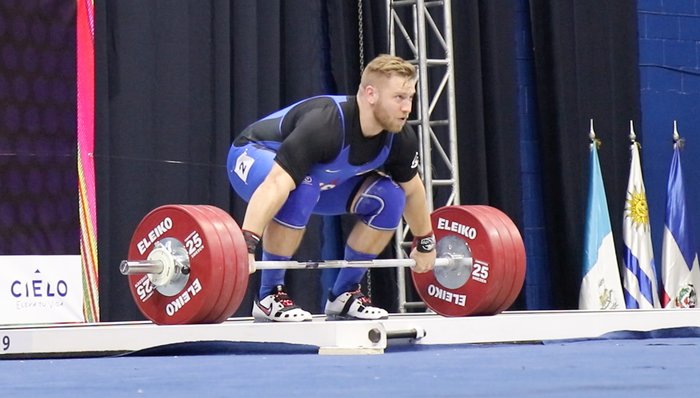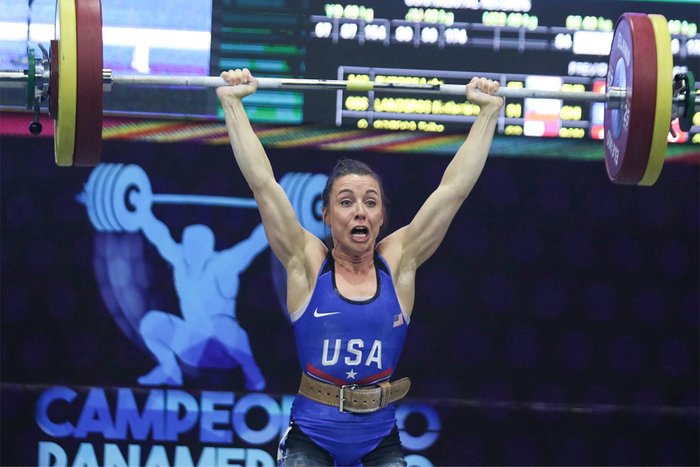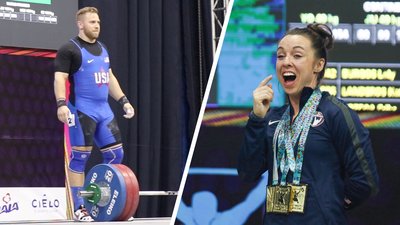What is Olympic Lifting | Learn the Olympic Lifts | Olympic Lift Variations | Olympic Lifter Quiana Welch | Weightlifting Champions Wes Kitts and Alyssa Ritchey
Every athlete wants the PR total. The first-place finishes. The victory that seals the title of best in the state, the country, or the world. These golden moments don't happen just by chance, especially if you want to compete at a high level—and that goes in any sport. For Olympic weightlifters like Wes Kitts and Alyssa Ritchey, the years of hard work, long hours in the gym, and consistent attention to all the variables have made them the champs they are today. They put their efforts into full-throttle when prepping for meets, with meticulous and sometimes brutal training and nutrition protocols.
All of it paid off big-time for these Team Bodybuilding.com athletes in April at the 2019 Pan American Championships in Guatemala, where they each took home the gold and smashed records in their respective weight classes. Kitts broke a world record total with 399 kilograms (879 pounds) in the men's 109-kilogram weight class, which included an American-record clean and jerk of 223 kilograms and a 176-kilogram snatch.
Ritchey dominated the 49-kilogram women, taking home three gold medals, two Pan American records, and two American records with a 107-kilogram (235 pounds) clean and jerk, a feat representing the greatest percentage of body weight ever lifted by an American.
It takes physical, emotional, and personal sacrifices when your sights are focused on outlifting everyone around you. Although not all of us will reach an elite international platform, Kitts' and Ritchey's methods of preparation are worth emulating if you're looking to improve and become a force in a competitive strength sport.
We sat down with these two Olympic contenders to chat about the mindset, the coaching, and the details that are nonnegotiable in making those gold-medal moments a reality.
Describe your training for the Pan American Championships. What was the hardest part? How did it differ from previous training cycles?
Wes Kitts: In January, we started working on basic strength, mainly squatting, and I was training about 30 hours a week just accumulating as much work as possible. It was more than I've ever done before—15 sessions a week for about three months. This initial block is easily the hardest part of any meet prep. Then we started getting more dialed in to snatches and clean and jerks. The last six weeks of training went really well, going heavy a number of times, and I had the expectation to make every lift. I felt really confident, prepared, and just stoked for the meet overall.

Alyssa Ritchey: That was probably the hardest and longest training cycle I've ever gone through. We were training for 16 weeks—and my training is quite different than what you might expect. I think people assume you need to hit heavy weights and max out all the time to prove that you can do it in competition. But if you have proper programming and a coach who knows how to handle the tonnage—number of reps and sets, what percentages you should be doing—you can train lighter to make sure you're also staying technically sound and be able to get in more reps throughout the training cycle.
You both have to make weight for competition. What are your top nutrition and weight-cutting tips for those who compete in weight class sports?
Alyssa Ritchey: First of all, you should only be cutting weight if you're standing on the podium at national or international meets. It's pointless if you're doing the sport for fun or when you have a long way to go to reach a high level. Second, weight cuts never get easier. But I think a lot of people don't track what they're doing. How will you know what you should change for next time? I write down everything—amounts of fats and carbs, timing, water intake, how much I move or don't move—so I can notice trends and what causes my body weight to shift one way or another. With that being said, you have to track your weight constantly, too. That whole last week of the meet you shouldn't be doing any extra physical activity—it all adds to fatigue, especially when you're cutting and already low on energy.
Wes Kitts: Everything you eat should be something positive for your performance—protein, veggies, water. I stay very clean but don't usually have to starve myself. My advice is to take and hold onto more than you think you can and be prepared to cut water for the last few hours if you need to lose 1-2 percent of your body weight. Eat clean up to the meet and be sure your weight is just slightly above where you need to be well before the meet. Then you can take out water for the last 8-24 hours and rehydrate post weigh-ins.
Discuss the factors outside of training and nutrition that affect your performance. How important are sleep, recovery, and moral support?
Wes Kitts: Obviously, as the meet gets closer, everything is important. Especially rest. For me, it's making sure I get 8-10 hours of sleep a night, especially on those last few days leading into the competition. There's no reason to stay up late watching TV or messing around on your phone. About a month out from this meet, I also started going to a lady who teaches yoga to athletes, utilized the cryo chamber when necessary, and hit the sauna 4-5 times a week. Massage was in the mix earlier on in the meet prep, but I felt so good this time around, I didn't feel like I needed it as much.

Alyssa Ritchey: If you don't get your sleep, you're probably not going to be at the top level. The last six weeks of training, I do not set an alarm; I just wake up whenever my body wakes up. I make sure I get to bed at 9 p.m. every night. I also switch up the time of day that I train so my body gets used to any time changes that I have to make due to where or when I compete. I do physical therapy 2-3 times a week when I'm getting ready to compete—otherwise, my body would just fall apart—and I get a lot of cupping, needling, and massage done. As far as support goes, even if I didn't have any, I'd be fine because that's just who I am. I do this because it makes me happy, but the people I do have in my life have to be supportive, or it just wouldn't work.
What does meet week look like for you?
Alyssa Ritchey: I rest a lot—there's very little movement, which is important for conserving energy. This time around was interesting because I had a number of things go wrong the week leading up to the meet. My back was strained from a massage, and then my tax lady forgot to do my taxes until, literally, April 15, so I missed my last training day before Pan Ams to finish them. On the way to Guatemala, the airline lost my bag with my food, food scale, coffee, and clothes, and my flight was delayed for nine hours. Plus, the weight cut on top of it all. But the bottom line is, I would never ever have used any of that as an excuse if I had done poorly. I had two choices: either I'm going to let it affect me and ruin all the training I put in for 16 weeks, or I'm going to win this. Things could be a lot worse, so let's win.
Wes Kitts: Over the last two weeks, my number of sessions creeps down to once a day and then every other day. The final week is where the diet gets crucial, especially on the week of the meet, where your training days run out. You don't want to waste workouts, and you definitely don't want to waste any meals. The night before the meet, I went to bed at 111.8 kilograms, and I had to weigh in at 109 kilograms. When I woke up, I was at 109.8, so I ate breakfast and took two 15-minute sauna sessions before I went in to warm up.
How do you prepare mentally before the meet starts? Do you have a routine that you go through before every meet?
Wes Kitts: I try to think about it as little as possible up to weigh-ins. It's very easy to sit around and simmer about your performance all day, and that just uses up your energy. Always thinking can wear down your mind, and it just makes it harder to relax. I'll watch ridiculous stuff on Netflix, lie around, and do some stretching to stay loose. After weigh-ins, I immediately start eating and drinking and warming up. There's so much to do in the two hours between weigh-ins and the platform that I don't even have time to think; I'm going in and lifting barbells before I know it.
Alyssa Ritchey: I don't have a routine, really. I'm just very positive with my thoughts, and I focus on making my lifts and visualizing exactly how each one should look on the platform. I do bring books—for this meet I had Ronda Rousey's book with me—and I'll flip open a chapter to read something that's going to help me stay in the right mindset.
What was your go-to meal after you weighed in?
Alyssa Ritchey: Three oatmeal packets and Pedialyte!
Wes Kitts: This time around I had protein bars, Nutella, and bananas to eat and drank CytoSport. Probably 1,200 calories in a sitting!
What's the biggest thing that you look to your coach for during a meet? How would you describe a "good coach"?
Alyssa Ritchey: After Worlds last year, I was pretty upset with how things went. Max and I sat down and talked it over, and it was a point in our relationship as coach and athlete that changed everything. He started programming completely differently, and things turned around. Instead of being a child about it and not talking, I decided to say, "Look, this is what I feel. This is what I want. This is what I need." Communication and trust are the biggest things between a coach and an athlete. I have to trust Max no matter what, and it's also on me to go out there and make my lifts. Another thing to remember is you can't jump from coach to coach. Give it time to build that relationship.
Wes Kitts: It's important to find someone who can coach technique, write programming, and track your nutrition and recovery. On meet day, your coach should handle counting attempts, getting you to warm up on time, making adjustments, and knowing when you need to go out to lift. They have to be pretty knowledgeable of the whole field. A good competition coach is different than a good training coach. Fortunately, mine is well versed in about everything. We have a very good line of communication with programming, and in competition everything goes off without a hitch. Your coach needs to be able to modify your technique and program properly, but you also want to know that you're not going to get overcoached.
What went through your mind before and during your winning lifts?
Wes Kitts: Honestly, the only thing in my mind is images of me completing the lift. I'm in cruise control at that point, always seeing myself smashing whatever the number is. I'm going to do it. It's going to happen. The ultimate confidence and knowing that it doesn't matter what the weight is—you're going to make it.
Alyssa Ritchey: "I'm going to make this lift. I'm going to crush this because I practice hard and I know that I can make it." That's literally it. When you complicate it, you start thinking too much.
What do you do when things aren't going as planned, whether it's during prep or at the meet?
Alyssa Ritchey: What happened at the Pan Ams, with all the weird things that went on, is a great example of how to stay calm and focused. [My mentality is] I'm going to have fun. I don't have to make myself do this because I like to do this. If something is going wrong, I pull myself back and say, "Hey, look. You've trained hard for this. You're fine. You're ready for this." A lot of positive talk. And reminding myself that ultimately, this sport makes me happy.
Wes Kitts: During the preparation, if there's something that feels off, usually I will make up for it with more time practicing. If something didn't go well during the week or on my heavy day on Friday, I will go to the gym on Sunday and work with an empty bar to practice my technique. It allows me to reset for Monday. You can't let things get to you mentally because it's going to create doubt. Confronting problems with practice has been my main fix for that. In a meet, if you're having issues in the back room or on a platform, channel your willpower into attacking the weight that's on the bar, no matter what.
What are your biggest tips for other lifters to help them have a successful meet prep?
Alyssa Ritchey: Know that it's going to be hard, but anything hard is worthwhile. Anything that challenges you is going to be worth the sacrifices and is very fulfilling in the end. If you're new to the game of weightlifting or any strength sport, just have fun and enjoy the process. You never get the training or competing time back. If you're constantly stressing out or being a mental case, let loose a little bit because that's the only way that you're going to love what you do.
Wes Kitts: On meet day, stay relaxed leading up to your session and be prepared to get your food and water down quick after weigh-ins, especially if you have a two-hour window rather than 24 hours. Then, focus on the competition. You have to stay dialed in, even intense, and do your best. If the wheels start falling off, it comes down to one lift at a time.
Check out our podcast with Alyssa Ritchey to learn more about her journey as a weightlifter.

